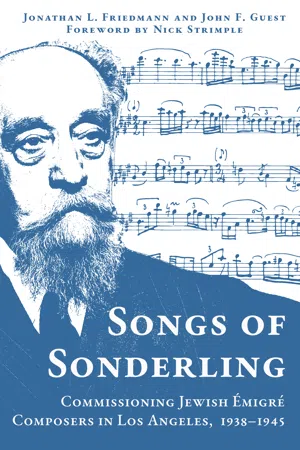![]()
Illustrations
Rabbi Jacob Sonderling in his study, 1951
Rabbi Jacob Sonderling in his chaplaincy
uniform, German Army, 1915
Canter’s Deli, Fairfax District, Los Angeles, 1948
Rabbi Jacob Sonderling planting a tree at Brandeis Camp
Institute, May 3, 1964
Article by Rabbi Sonderling, Los Angeles Times Sunday Magazine, October 2, 1938
Images courtesy of Western States Jewish History Association Archives
![]()
Foreword:
A Personal Appreciation of Rabbi Jacob Sonderling and His Commissioning Project
A couple of years before his untimely death, George Korngold came by my office to chat. A highly regarded classical record producer, as well as the son of Erich Wolfgang Korngold, George wanted to explore some possible recording projects with the Nuremberg Symphony Orchestra, an ensemble with which I had begun working only a short time before. Toward the end of the conversation—which was focused on nineteenth-century Czech orchestral works—he mentioned a choral composition, A Passover Psalm, by his father, and asked if I would consider programming it in Los Angeles. He described the premiere, enthusiastically recounting that when the performance ended, a member of the congregation (Edward G. Robinson, no less!) stood, declared that it was the most beautiful thing he’d ever heard, and suggested, because of its brevity, that perhaps it could be repeated. And it was. A couple of days later, George brought me a tape cassette recording of the premiere, apologizing that he had been unable to find the sheet music. We listened to the cassette together, and I promised to look for an opportunity to perform it, fully understanding why Edward G. Robinson wanted to hear it twice. But George Korngold died in 1987, before we could record in Nuremberg or present his father’s composition in Los Angeles. And he never said anything to me about the commissioning of A Passover Psalm.
Sometime before George Korngold died, I was contacted by Malcolm Cole, a distinguished musicologist at UCLA and a close friend. Malcolm wanted me to consider performing choral music by a composer totally unknown to me: Eric Zeisl. He introduced me to Zeisl’s daughter, Barbara Schoenberg, who in turn introduced me to her husband, Ronald Schoenberg, son of Arnold Schoenberg. Together, Malcolm and Barbara gently nudged me into including Zeisl’s Harlemer Nachtlied in a February 1988 concert. Soon after this concert, the Schoenbergs introduced me to Hugo Schally, diplomat in charge of cultural affairs at the Austrian Consulate in Los Angeles, who had a very interesting idea for two concerts during the upcoming Mozart Year (1991) that would include music by Korngold, Zeisl, and Schoenberg as well as Mozart. I conducted these concerts with the Choral Society of Southern California. A few days after the first concert (which concluded with Zeisl’s Requiem Ebraico) I received, in close succession, phone calls from Barbara Schoenberg and Neal Brostoff, each inviting me to conduct the Choral Society in Zeisl’s Requiem Ebraico and the premiere of the organ version of Schoenberg’s Kol Nidre in an upcoming concert that Neal was organizing. This concert took place on May 28, 1992. And this is when I first learned about Rabbi Jacob Sonderling and his commissioning of music.
Jacob Sonderling was obviously successful as a rabbi and civic leader in Los Angeles. However, his commissioning project may overshadow all else. When he arrived, Jewish composers in Southern California were aligned in two distinct camps: those who worked exclusively in the synagogue or the secular Yiddish-speaking world of the Workmen’s Circle (Der Arbeiter Ring, which had been established in Los Angeles in 1900), and those who worked either in Hollywood’s sprawling entertainment industry or in the realm of classical concert music (or both). Rabbi Sonderling saw an opportunity for émigré composers from the latter group to produce music that would not only connect with his own congregation but also, potentially, connect with a much broader audience. He apparently imposed no stylistic restraints, and the works were to be composed in a genre most familiar to the composers: that is to say, with orchestral accompaniment.
These commissions provided the composers with a unique opportunity to embrace their cultural and religious heritage: Erich Wolfgang Korngold reconnected to the Jewish community at a profound level; Ernst Toch produced a major work on a topic that, because of the family-oriented nature of the Passover liturgy, had been largely ignored by Jewish composers; Eric Zeisl honored the memory of his parents and all other Holocaust victims in a way that illuminated Sabbath ritual; and Arnold Schoenberg, the Christian convert who had returned to his ancestral religion, came to grips with a liturgical, theological, and moral issue that had apparently bothered him all his life.
Moreover, Sonderling’s commissions—while not the first such projects in the United States—were certainly influential beyond the boundaries of Los Angeles, providing, for example, an impetus for Park Avenue Synagogue in New York City, following the earlier example of Salomon Sulzer in Vienna, to begin its very successful project of commissioning composers (Jewish and Gentile) to compose small liturgical works expressly for worship. Further, Sonderling’s spirit may be discerned in the current efforts of a number of prominent and enterprising conductors—Joshua Jacobson, Coreen Duffy, Iris Levine, and Noreen Green, for example—who have worked tirelessly to introduce Jewish music to a broad non-Jewish audience.
In my case, I might never have become involved in Jewish music had it not been for the efforts of Rabbi Sonderling. His commissions opened the door to...
